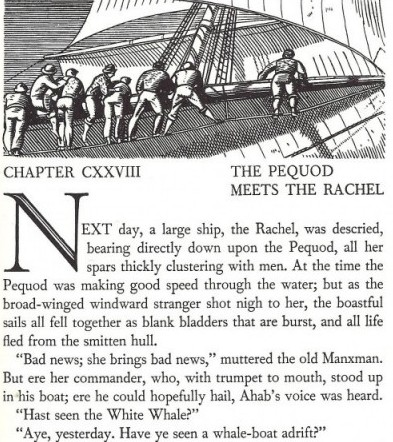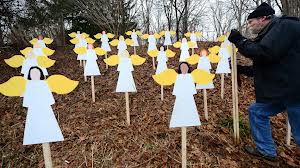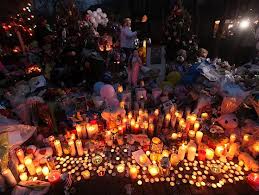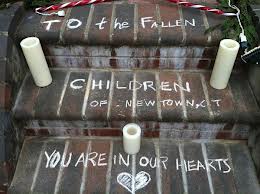“Without the least quivering of his own.”
In a chapter towards the end of Moby Dick, The Pequod Meets the Rachel, you know that Ahab is a goner– that his mission to kill the whale has stolen his soul– when he refuses to help another whaling captain look for his son lost at sea. When the two ships approach each other, the Rachel’s desperate captain scrambles onboard the Pequod to implore Ahab to join him in the search for this lost whale-boat; onboard were both his son and that of another of the Rachel’s crew members, this one only twelve years old. The Rachel had been searching for the lost children throughout the night. The Rachel’s captain pleads with Ahab, offering to pay him for his help. But Ahab is unmoved. Melville writes:
Meantime, now the stranger was still beseeching his poor boon of Ahab; and Ahab still stood like an anvil, receiving every shock, but without the least quivering of his own.
“I will not go,” said the stranger, “till you say aye to me. Do to me as you would have me do to you in the like case. You too have a boy, Captain Ahab…
But Ahab turns away. He knows that his White Whale is near and he will not veer from the hunt, not even to help this “stranger” who is suffering the heartbreak of losing a child. He must avert his face to do so, but still Ahab turns, “leaving the strange captain transfixed at this unconditional and utter rejection of his so earnest suit.”
It has been four weeks since the shootings in Newtown, and I am worried about turning away, about forgetting. In the days after the shooting, I found that—when I wasn’t in a blur of tears– I wanted to kiss everyone I knew, because even this distant taste of such horror was squeezing me, and the only way out was to turn towards the good people in my life. The gaping hole of terrible loss made all of their faces– my children’s and their classmates, my friends and family, the teachers and other parents at my children’s schools– that much more precious. I basked in my children, my friends and community. Something split open in me—and I don’t know that it’s a good thing if that entirely closes back up.
But it IS probably a good thing that I’m not still sobbing and laying awake at night worrying about those parents and children and the first responders. Life keeps moving. But I think about them. Everyday. And I also think about this particular chapter of Moby Dick and what Melville knew— that we are doomed when we turn away from each other. Poor Ahab is so caught in his self-centered mission that he is like an anvil “without the least quivering of his own.” And he is miserable.
Also, this captain of the Rachel is not REALLY a stranger. Melville writes early on in the chapter that Ahab actually knows this man from Nantucket. But even so, Melville references him many times as “a stranger.” I believe Melville does this to show that Ahab had to distort the truth of their relationship in order to turn his back on him. When we see people as strangers, as inherently separate and strange, then we can ignore how we are all in the same boat, so to speak, even if one if called the Rachel and the other the Pequod, one is called me, the other you, one is Austin, the other is Newtown.
I’ve felt this over the last few weeks, particularly when someone close to me said, “Thank god they weren’t our children.” True enough, literally– we are not the ones going to so many funerals and staring at the Christmas gifts that now will not be opened. Our lives are not so intimately shattered. But on one level, all parents can feel the blackness of the unsayable loss, even if it’s not literally our own. That’s why the captain says, “For you too have a boy, Captain Ahab.” Melville even emphasizes the “you” with italics. We are in the same boat, and the agony of one parent’s loss is not entirely separate from our own. If you don’t avert.
I hope we, as a country, don’t turn away. I hope that whatever lessons we need to learn from this heartbreak will get a chance to work on us. If that means that our government makes the buying of semi-automatics as regulated, say, as the driving of cars or adoption of pets, I will be happy. According to the Wall Street Journal, after the Dunblane school shooting in Scotland in 1996, the UK began to better regulate gun sales. As a result, there were only 44 gun-related homicides in 2011-2012 as compared to over 8000 in the US. I’m not saying that gun regulation can stop a guy on a mission of self-destructive hate. I don’t know what the answer is and I don’t entirely trust the people who think they do. But I do believe that just like we have laws to make driving safer, we should have laws to make gun ownership safer.
Like those Newtown parents, I am well acquainted with the unique and irreplaceable beauty of a first grader. My daughter and her classmates, in first grade now, astound me daily. Life is an unfolding adventure for them: they are making good friends, really reading for the first time, standing on top of the playscape and shouting out silly songs and clapping out rhymes. To hold my daughter’s flushed, lit up face in my hands— it’s a love rush, like mainlining oxytocin. To have a deluded man take that away from me is unthinkable. And while I can’t comfort those parents who have lost their first graders, I also don’t want to turn away from them and the memory of their children because I’m so consumed with my own whales. I don’t want them to feel alone. I think about the image of the Rachel, disoriented with grief, with which Melville ends this chapter:
“But by her still halting course and winding, woful way, you plainly saw that this ship that so wept with spray, still remained without comfort. She was Rachel, weeping for her children, because they were not.”








